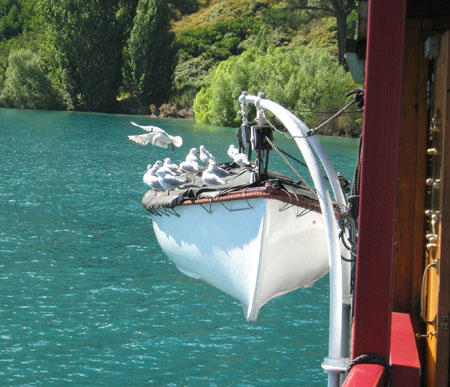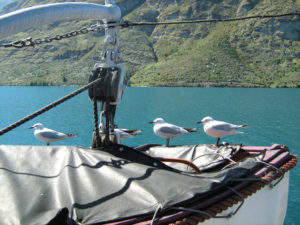
On a holiday to New Zealand a little while ago, on a cruise on Lake Wakatipu, I was amused to see a flock of seagulls hitching a ride on the Steamer’s life boat. I thought at the time what a good life they had in such an idyllic environment. No work to do, transport provided between scenic locations and plenty of tourists to throw them the odd crust or even a hot chip.
This is quite unlike organisational life where we are expected to continually strive harder and continually improve our skills just so our wages keep pace with the cost of living. In fact, I recalled once learning a salutary lesson during a period of negotiations with the Australian Workers Union over wages for Blue Collar workers.
At the time, my organisation was new to the concept of Enterprise Bargaining and filled with the idealism that comes with wanting to make the most of modern techniques, we were determined that the next round of wage rises would be accompanied with real productivity gains, and that all sections of the Workforce should contribute extra effort in order to earn their annual increases.
At a meeting of Blue Collar staff our Industrial Officer outlined the need for all employees to aspire to better and more fulfilling jobs by working “smarter not harder”, seeking to “go the extra mile” in everything they do and to look about their job sites for ideas to improve productivity. In that way, he said, they could demonstrate “added value” and justify a proposal that was on the negotiating table for a bonus system.
As the meeting broke up there was much grumbling and derision aimed in the direction of Management. I had to admit a degree of unease myself, as I wasn’t convinced that the message given was right for the particular audience. I noticed one of the Union delegates in animated discussion with some of the more vocal members of the crew and afterward took him aside for a brief chat.
“The boys don’t look sold on the new approach” I said. “Can you blame them” he said. “You are asking them to do something that is contrary to their basic nature.” I obviously looked confused.
“Look” he said, “You can’t soar like an Eagle when you have the genetic makeup of a Seagull.” He went on to explain that he was not intending to belittle his members, but the reality was that they were, by and large, labourers and unskilled workers. They did not approach their daily job on a high intellectual level. “All they bring to work is their physical strength and labour. That’s all you can ask of them. You can’t hold their pay rise to ransom over something that is not in their make-up. Work process improvement is Management’s responsibility anyway.”
Soaring like a Seagull
I thought that over and agreed with him – but only up to a point. I proposed a down to earth strategy I thought might provide wins for both sides. The organisation had a couple of problems in the Workforce that needed to be addressed and they really needed the cooperation of the workers to be successful.
My proposal was that –
- Management would not require ordinary workers to identify work process improvements other than where they voluntarily made good suggestions, in which case we would introduce an acknowledgement scheme to reward good ideas;
- Workers would commit to full cooperation with the introduction of a more vigorous Worksafe program, including a program targeted at workers who presented for duty affected by alcohol or drugs;
- Workers would commit to cooperating with their Supervisors and Management in creating more flexible working arrangements so that process improvements could be made.
- In return the Workers would get their annual wage increase automatically without needing to prove productivity increases, as these would have been achieved if they cooperated with the more flexible arrangements.
It took a little more talking but very soon we had the foundations of a very workable agreement and a much happier workforce. The Worksafe initiatives progressed well and were in the workers’ interests anyway and the more flexible arrangements resulted in shorter and less arduous periods on construction sites.

Now when I see a gathering of Seagulls it is obvious that they are content in their own feathers and don’t aspire to be eagles….and we should try to force them to be.

